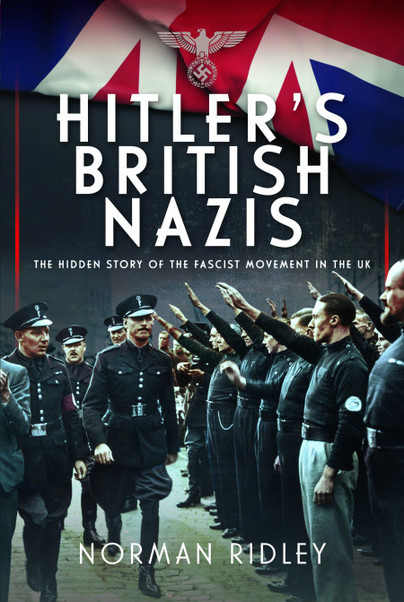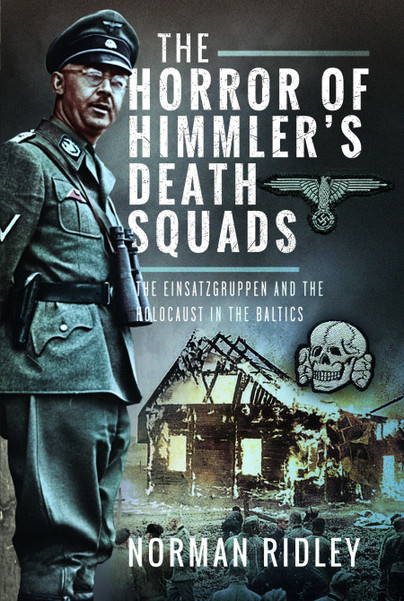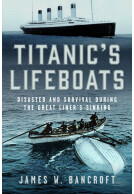Hitler's British Nazis (Hardback)
The Hidden Story of the Fascist Movement in the UK
(click here for international delivery rates)
Need a currency converter? Check XE.com for live rates
| Other formats available - Buy the Hardback and get the eBook for £1.99! | Price |
|---|---|
| Hitler's British Nazis eBook (5.0 MB) Add to Basket | £6.99 |
Following the end of the First World War, many countries experienced economic decline. Unemployment, high inflation, low wages and poor working conditions led to widespread unrest. This manifested itself in the rise of powerful militaristic leaders, first in Italy where fascism was born, and then in Germany and elsewhere. The policies of the likes of Mussolini and Hitler were hugely popular, and fascism was seen by many as a viable political alternative to democracy.
To some degree, these ideals also gained traction in the UK where some individuals in and among the elite of British society believed fascism was the way forward for the country. This is fully explored in Hitler’s British Nazis which traces the evolution of extreme right-wing opinion from the turn of the century right through to the end of the Second World War. In particular it looks at the way British fascism developed its own character due to Britain having been on the winning side during the First World War.
Early fascist movements of the 1920s are analysed including the fascist tendencies of the Suffragette Movement. The book then traces the way in which domestic politics and the dire economic situation of the early 1930s created a political vacuum that was filled by Oswald Mosley and his Blackshirt Movement.
Throughout the 1930s right-wing sympathisers looked to Hitler’s Germany rather than to Mussolini’s Italy for inspiration. Some members of aristocratic and political elites, many with virulent anti-Semitic views, saw in German fascism a template for Britain to build on but remained wilfully blind to the excesses of the Nazi regime that were getting worse by the day.
The book looks at the way in which Nazi Germany was depicted in the press and how powerful press barons, many of whom were pro-German and supported Chamberlain’s appeasement policies, were able to influence public opinion.
The role of the Mitford sisters, Unity in particular, is explored in detail as is the influence of the Cliveden Set under the leadership of the Astors and perhaps most interesting of all is the role played by King Edward VIII and Wallis Simpson as they flirted unashamedly with fascism and threatened to take Britain down a very different path to that which it took after the abdication.
Rating: 5 out of 5 stars
NetGalley, Susan Johnston
This is an interesting book that tells the stories of a number of British Nazis, people who either liked fascism as a means to solving the problems of the world or were extremely antisemitic. Or possibly both. Much of the book focuses attention on the elite who, when dealt with by authorities, often received little more than a slap on the wrist. Those supporters of lesser social and economic standing were often treated to the full extent of the law.
It is no wonder that throughout the early 1930s there was much admiration for the Nazis. Many of the news outlets refused to tell the true story and cheered the results. They got things done and those pesky rumours of atrocities against Jews, who cares. Some even thought the Jews brought the treatment on themselves. It was only when Germany began its conquest of other countries, bloodless at first, and the calls for rearmament, that some of them, at least publicly, changed their tunes. Many, however, remained fans even past the declaration of war.
The list of conspirators is vast and reads like a who’s who of the aristocracy. Of course, it helped that one of the biggest supporters was Edward VIII. Thankfully his hubris took him off the throne before he could do the most damage. It is fascinating to watch the spider’s web of connections that link so many of these people together. I am thankful they were not able to succeed. Five purrs and two paws up.
Article: Local historian uncovers the hidden histories of UK fascism
Jersey News
https://www.bailiwickexpress.com/jsy/news/local-historian-uncovers-hidden-histories-uk-fascism/
Rating: 5 out of 5 stars
NetGalley, Anita Wallas
Norman Ridley’s account of British fascism is truly fascinating. His research appears to be meticulous and he really brings the issues and people to life. I was unaware of the influence of fascism on the suffragette movement. The detail about more familiar individuals, Moseley, Mitford and, of course the odious Edward and his wife, Wallis Simpson. I believe there’s little doubt that Britain would have become a very different country if Edward had remained King and there’s remarkable insight into this possibility within the detail here.
The story resonates currently with an appalling rise in anti semitism and the extent to which the two movements were so closely linked was disturbing. It’s interesting and worrying to realise that many elements of fascism remain today. Bubbling away under the surface and understanding the extent to which the roots of this controlling movement are threaded through society is quite a revelation. This is an important and interesting slice of social history. Really well presented so it’s accessible for any reader with an interest in modern history.
Rating: 5 out of 5 stars
NetGalley, Stephen Dale
A history of the Fascist Movement in the UK with its heyday of the 1930s still in the memory of our most senior citizens. We read of the involvement of some of our well known aristocrats and politicians and the role of much of our press.
Prior to this period shows us how the Suffragette Movement idealogy was intertwined and while we know of Edward VII and Wallis Simpson sympathies this book gives more detail of the part they played and wanted to pursue. An excellent read.
Rating: 5 out of 5 stars
NetGalley, Mariel Renaud
“Hitler’s British Nazis: The Hidden Story of the Fascist Movement in the UK” is a captivating and enlightening exploration that shines a spotlight on the remarkable history of fascism during World War I and the buildup to World War II. Through meticulous research and vivid storytelling, the book delves into the lives and missions of the people who played pivotal roles during this period. The author chronicles the impact of certain people, including Oswald Mosley, Diana Mitford, Unity Mitford, Winston Churchill and even the details surrounding King Edward VIII and Wallis Simpson. It is a concise narration of how fascism developed, evolved, and spread throughout Europe and Britain. It explores why the populations of countries such as Germany felt compelled to embrace radical extremism after the First World War, attributing it to events like The Great Depression.
Starting from the very beginning, the book portrays life journeys in a captivating way, highlighting the lack of tranquillity in their lives. The narrative underscores the intrigue involved, while Norman Ridley also acknowledges the collective contributions of numerous others towards the war effort. A part of the book concentrates on highlighting each person mentioned in the book, their background and the role played, enriching the reader’s understanding of their importance. One of the book’s strengths is its focus on the lesser-known facts of this era, including perspectives on wartime intelligence and possible cover-ups. The author’s meticulous research is evident throughout the book, providing readers with a comprehensive and well-rounded understanding of the subject.
This book is a fascinating read. I never considered how much anti-Semitism and Nazi support existed in Britain before World War II. The amount of information contained within this book astounded me. I have read many books surrounding Hitler and World War II, but this was my first time discovering this topic. It was truly eye-opening to discover that in the 1930s, many privileged young women were sent to Germany for "finishing" purposes. I was left speechless when I learned that they were sent to a country Britain had recently been at war with.
Overall, Hitler’s British Nazis is a compelling and well-written account analyzing fascist tendencies. It is a must-read for anyone interested in World War, British history and espionage.
It deserves a perfect rating of 5 out of 5.
Rating: 5 out of 5 stars
NetGalley, Karl Wardlaw
This book provides an interesting history of early fascist movements and how they developed.
This book describes the various personalities involved in the fascist movement and also the personalities of those who sympathised with the movement within the major parties.
Rating: 5 out of 5 stars
NetGalley, George Schaeffer
A very interesting and relevant overview of Britain’s fascists during the 1930’s.
About Norman Ridley
NORMAN RIDLEY is an Open University Honours Graduate who writes about the less well covered aspects of 20th Century history. He lives in the Channel Islands.
The Horror of Himmler’s Death Squads The Einsatzgruppen and the Holocaust in the Baltics (Hardback)
During the Second World War, Lithuania, Latvia and Estonia were occupied on three separate occasions – twice by the Soviet Union and once by Nazi Germany. The signing of the Ribbentrop-Molotov Pact of 1939 allowed the Soviets to dominate the Baltic states without fear of German reprisals, causing many in the German-Baltic populations to flee to Poland. Soviet rule of the Baltics was brutal with the purging of political elites and deportation of many tens of thousands in a bid to turn them into vassal states. Consequently, when Hitler launched Operation Barbarossa in June 1941, many Balts saw…
By Norman RidleyClick here to buy both titles for £47.00





















